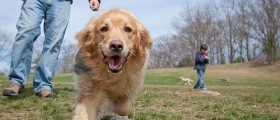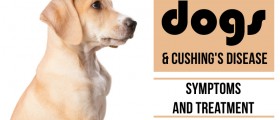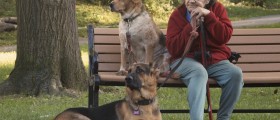
Keep your dog healthy
The healthy dog
Coat and skin can help you to determine condition of any dog from a glance. Coat of a healthy dog is shiny and flexible, without dandruff, bald spots or clots. It is natural for dog's coat to be greasy a bit, but excess grease is not good. Skin of a healthy dog is smooth, flexible, and can be pink, brownish or dark, depending on dog's race. On its surface, it should be similar in properties like a healthy human skin.
Bright, shiny, lively eyes indicate a healthy dog, while a minor amount of mucus is also fine. Mucous part of the eyelids should not be swollen, inflamed, painful to the touch.
Ears of all dogs are light pink and clean on the inside, with no abnormalities. Moderate presence of wax is normal, while heavy waxing indicates some irregularity, as do too frequent shaking of the head or scratching of the ears.
Typical nose of a healthy dog is wet and cold, with clear discharge, but a dry and warm nose does not mean that the dog is sick. It is best to measure dog's temperature in a regular way to determine if it has become sick.
Mind the dog's mouth - its gum should be free from lesions and inflammations, with strong teeth, and a dog's breath should not be foul. Any less-than-perfect condition of your pet's mouth should lead to a visit to the vet.
Urine of a healthy dog is clear and yellow. Droppings should be firm, while watery, bloody or runny stools, as well as straining, indicate a problem and you should pay a visit to your vet.
Remember to vaccinate your dog regularly. Visit your vet to learn when to come for vaccination and what vaccines to get.
Sick as a dog
Unusual behaviour of a dog is always a symptom of trouble. Consult a vet if you see your dog vomiting, fainting, loosing balance and staggering, coughing, running a thick and unhealthy-looking discharge from nose and eyes, breathing hard, lacking appetite for over 24 hrs, sleeping too much or being too inactive, limping, protecting or not using a part of a body.















Your thoughts on this
Loading...